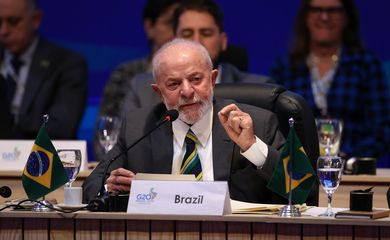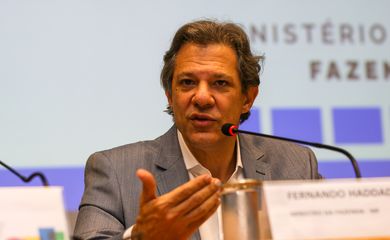Brazil aims to tax super-rich to fund Alliance against Hunger

Brazil plans to use funds from taxing the super-rich to finance initiatives of the Global Alliance against Hunger and Poverty, stated Finance Minister Fernando Haddad on Wednesday (Jul. 24) during the initiative's pre-launch in Rio de Janeiro.

The Alliance is one of the priorities of Brazil's presidency of the G20 (a group of the 19 largest economies on the planet, plus the European Union and the African Union). It consists of a set of measures aimed at mobilizing resources and sharing expertise to eliminate global food insecurity.
"In many parts of the world, the super-rich employ various strategies to evade tax systems. This results in a regressive rather than progressive tax structure at the top of the income pyramid [where the wealthy end up paying less]," stated Haddad.
The Finance Minister cited a study by French economist Gabriel Zucman, commissioned by Brazil, which suggests that taxing billionaires at 2 percent of their wealth could generate up to $250 billion annually.
"That's approximately five times the amount allocated by the ten largest multilateral banks to combat hunger and poverty in 2022," Haddad noted in comparison.
According to the minister, the Global Alliance operates under the premise that the international community has the capacity to ensure decent living conditions for all. "What has been lacking is political will. The Alliance aims to catalyze this will," the minister explained.
"It is imperative that we mobilize to increase international resources for addressing hunger and poverty. We must explore innovative financing instruments for development," he urged, highlighting examples such as public-private partnerships and reforms in multilateral banks.
Despite being launched in the G20 environment, the Global Alliance is open to countries outside the group, as well as international organizations. At this stage, the terms are formalized, and the way is opened for interested countries to join.
Proposal endorsed
The initiative will be officially presented to G20 member countries at the summit on November 18 and 19, which will also take place in Rio de Janeiro. However, during Wednesday's event, participants in the working meetings—including ministers, central bank presidents, and representatives from multilateral organizations—endorsed the terms of the Brazilian proposal that will be presented at the summit.
The president of the Inter-American Development Bank (IDB), Ilan Goldfajn from Brazil, and the president of the World Bank, Ajay Banga from India, participated in the pre-launch event and voiced institutional support for the initiative.
Goldfajn affirmed that the IDB is committed to eradicating extreme poverty in Latin America by 2030.
Ajay Banga did not specify the amount the bank would invest in combating hunger but assured that it would be a "key partner" in the Global Alliance. He also emphasized the bank's commitment to reaching half a billion people with financing actions by 2030.
"This is a historic milestone. If realized, it will positively impact the lives of millions worldwide," celebrated Wellington Dias, Brazilian Minister of Development and Social Assistance, Family, and the Fight against Hunger.
According to Dias, participating countries must prioritize the fight against hunger as a national policy, establish goals, and draw upon successful strategies from other nations, such as income transfer and school feeding programs.




Dê sua opinião sobre a qualidade do conteúdo que você acessou.
Escolha sua manifestação em apenas um clique.
Você será direcionado(a) para o sistema Fala.BR, mas é com a EBC que estará dialogando. O Fala.BR é uma plataforma de comunicação da sociedade com a administração pública, por meio das Ouvidorias.
Sua opinião ajuda a EBC a melhorar os serviços e conteúdos ofertados ao cidadão. Por isso, não se esqueça de incluir na sua mensagem o link do conteúdo alvo de sua manifestação.
Clique aqui para mais informações sobre a Ouvidoria da EBC.










